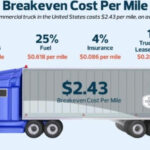Sure! Here’s an original and detailed explanation of some of the best states in the U.S. for truck dispatching, focusing on their unique advantages:
1. Texas
- Strategic Transportation Hubs: Texas boasts major cities like Dallas, Houston, and San Antonio, which serve as crucial logistics centers. Houston, in particular, has one of the largest ports in the U.S., which significantly influences freight traffic.
- High Freight Volume: Due to its large size and diverse economic sectors—such as oil, agriculture, and manufacturing—Texas generates a substantial amount of freight activity.
- Robust Infrastructure: The state is equipped with a comprehensive network of highways and interstates, including major routes like Interstate 10 and Interstate 35, facilitating efficient trucking operations.
- Business-Friendly Environment: Texas is known for its favorable business climate, including lower taxes and a generally supportive regulatory framework.
2. California
- Port Access: California is home to some of the busiest ports in the country, including Los Angeles and Long Beach, making it a critical state for both import and export logistics.
- Diverse Freight Needs: The state’s large economy, driven by industries such as technology, entertainment, and agriculture, creates significant freight demands.
- Advanced Infrastructure: California has a well-developed transportation network, although heavy traffic in urban areas can sometimes be challenging for logistics.
3. Florida
- Strategic Trade Position: With its major ports in Miami and Tampa, Florida is ideally positioned for trade with Latin America, boosting its logistics importance.
- Growing Freight Demand: The state’s expanding population and key sectors like tourism and agriculture contribute to high freight needs.
- Developing Infrastructure: Florida is investing in its transportation infrastructure, which supports efficient trucking and logistics operations.
4. Georgia
- Key Logistics Hub: Atlanta is a major transportation center with a significant airport (Hartsfield-Jackson) and extensive freight networks.
- Strong Freight Activity: Georgia’s economy benefits from sectors such as logistics, manufacturing, and agriculture, driving freight demand.
- Efficient Infrastructure: The state’s highway system, including Interstates 20, 75, and 85, supports robust trucking operations.
5. Illinois
- Central Freight Hub: Chicago, often referred to as the “Rail Hub of North America,” is a central point for both rail and truck transportation, making it a key logistics hub.
- High Freight Volume: The city’s role in national and international trade results in a high volume of freight activity.
- Well-Developed Infrastructure: Illinois features an extensive network of highways and railroads that facilitates efficient transportation.
6. Ohio
- Midwest Logistics Center: Ohio’s central location provides strategic access to major markets in the Midwest, facilitated by highways such as Interstate 71 and Interstate 80.
- Diverse Economic Activity: The state’s strong manufacturing sector, along with other industries, creates substantial freight activity.
- Supportive Infrastructure: Ohio maintains a solid transportation network that supports trucking and distribution operations.
7. Tennessee
- Major Logistics Hub: Memphis, home to FedEx’s global headquarters, is a significant logistics and transportation center, enhancing the state’s role in freight management.
- High Freight Activity: The city’s central location and logistics infrastructure contribute to high freight demand.
- Strong Infrastructure: Tennessee benefits from a well-maintained network of highways and interstates.
8. Michigan
- Automotive Industry Influence: Detroit’s prominence in the automotive industry drives considerable freight demand related to manufacturing and parts distribution.
- Great Lakes Access: Michigan’s proximity to the Great Lakes provides additional shipping routes and logistics advantages.
- Efficient Transportation Network: The state’s highways and connections to Canada support effective trucking operations.
9. Pennsylvania
- Key Transportation Routes: Major cities like Philadelphia and Pittsburgh are well-connected by highways such as Interstate 76 and Interstate 95, which are crucial for freight movement.
- Economic Diversity: Pennsylvania’s economy, including sectors like manufacturing and healthcare, generates significant freight needs.
- Reliable Infrastructure: The state’s transportation infrastructure supports robust logistics and trucking operations.
10. North Carolina
- Growing Economic Hub: North Carolina’s expanding industries, including finance and technology, contribute to its freight activity.
- Port Access: The state’s port in Wilmington enhances its logistics capabilities for both domestic and international shipping.
- Improving Infrastructure: Ongoing investments in transportation infrastructure support the state’s growing logistics sector.
Summary
These states offer various advantages for truck dispatching, such as strategic locations, robust infrastructure, high freight volumes, and favorable business climates. Each state’s unique characteristics make them suitable for different logistics needs, depending on factors like industry focus, transportation requirements, and economic activity.

























